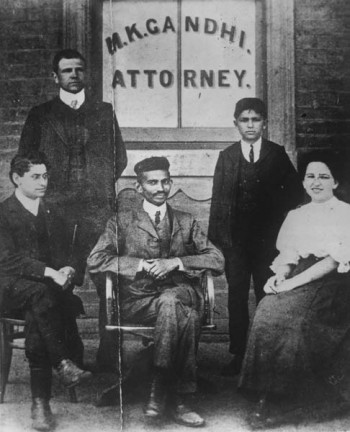Do we need another biography of Gandhi? Yes, according to Dr Ramachandra Guha.
Do we need another biography of Gandhi? This is the question with which Dr Ramachandra Guha launched Gandhi Before India, the first volume of his two-part biography of Mohandas K. Gandhi, at LSE last week (click here for an audio recording of the event). The biography spans Gandhi’s life from his birth in 1869 to 1914, when he returned to India after living in South Africa for two decades.
 Mahatma Gandhi when he was practising as an attorney in South Africa. He is seated in front of a window bearing his name, on the left is Henry Polak, and on the right is his secretary Sonja Schlesin.
Mahatma Gandhi when he was practising as an attorney in South Africa. He is seated in front of a window bearing his name, on the left is Henry Polak, and on the right is his secretary Sonja Schlesin.
Speaking at LSE, Guha explained why he felt another telling of Gandhi’s time in South Africa was necessary. He pointed out that Gandhi’s time outside India comprised half his life, but receives about one-fifth of the attention from his many biographers. Moreover, Gandhi’s early years are often viewed teleologically, interpreted to inform what came later.
But for Guha, Gandhi’s years in South Africa are truly formative, essential to understanding his personal and professional trajectory. It was through his relationships in South Africa with people of other religions that Gandhi became a religious pluralist; it was through his exposure in the diaspora to a variety of Indians – Hindi-speakers, Muslims, Tamils, Bengalis – that Gandhi understood his country’s heterogeneity and diversity and became a true Indian; it was in South Africa that Gandhi became critical of the Indian patriarchal approach to women, and where he started to practice civil disobedience and non-violence, or satyagraha. Without his time in South Africa, Guha suggested, Gandhi may not have emerged as a person of rare moral courage.
Guha also explained that the reliance of recent biographers on the 97 volumes of The Collected Works of Mahatma Gandhi gave impetus to his new book project. Rather than reinterpret Gandhi’s oeuvre, Guha’s book seeks to understand the lawyer-turned-activist from multiple angles—Gandhi’s writings; his friends and followers’ perspectives; and the point of view of adversaries and critics.
To this end, Guha described how he collected information from multiple sources to encapsulate Gandhi’s controversial life. The sources include letters by and to Gandhi stored in archives around the world, police and government records, news clippings from both the Indian and international press, and even a rare collection of materials in the Israeli port of Haifa.
During the book launch, Guha was willing to point out Gandhi’s shortcomings – he was a second-class student in his youth, and failed to establish a legal career for himself in either Rajkot or (then) Bombay – but also highlight how these led to his successes in South Africa. For example, on failing to establish himself as a lawyer in Rajkot, Gandhi took up an invitation to travel to South Africa to settle a dispute between Gujarati businessmen. Once there, he established a successful practice, and eventually became drawn into racial politics, mediating between the Indian diaspora and the Natal and Transvaal governments to champion Indian rights.
Another reason why Guha felt compelled to write this biography was to increase the profile of Gandhi’s mentors, followers, and friends from his time abroad, first in London, and then in South Africa. For, as Guha puts it, a good biography needs a good cast of secondary characters. And while the ‘supporting cast’ of Gandhi’s life from his years of involvement in India’s Independence movement is well known, the cast from South Africa remains largely anonymous.
Guha’s audience at LSE was therefore regaled with tales about the odd couple Henry Polak, a Jewish journalist, and Millie Graham, a Christian socialist, with whom Gandhi shared a home in Johannesburg. This period of Gandhi’s life was defined by feisty arguments about language, food, religion, politics, and patriarchy. Others whose impact on Gandhi was worth learning about included Sonja Schlesin, his secretary, and Pranjivan Mehta, “the Engels to Gandhi’s Marx”, his oldest friend, confidant, patron, and the first person to call him ‘mahatama’.
Clearly, Guha is correct in thinking that the world could do with another biography of Gandhi.
Dr Ramachandra Guha is author of Gandhi Before India and was Philippe Roman Chair in History and International Affairs at LSE IDEAS for 2011-2012.
Photo credit: DNA







Without doubt this is the best book written about Gandhiji’s life prior to his return to India..
Ramchandra guha is one the most insightful historian this is a thoroughly researched and well written book.. And coming to Flipkart services, I am just loving it..